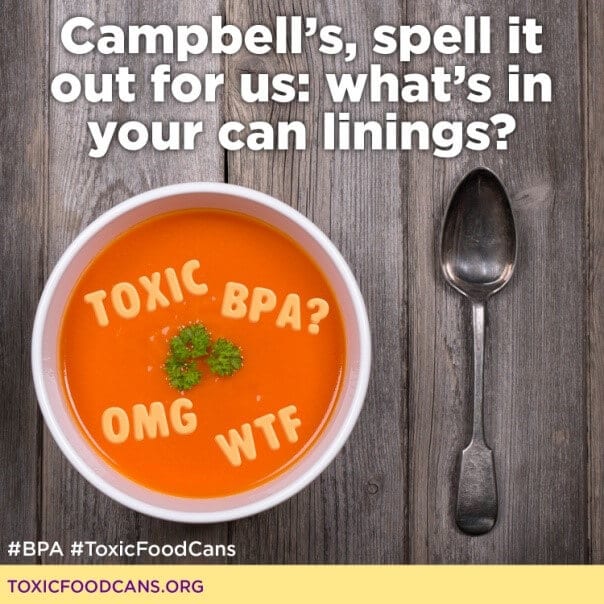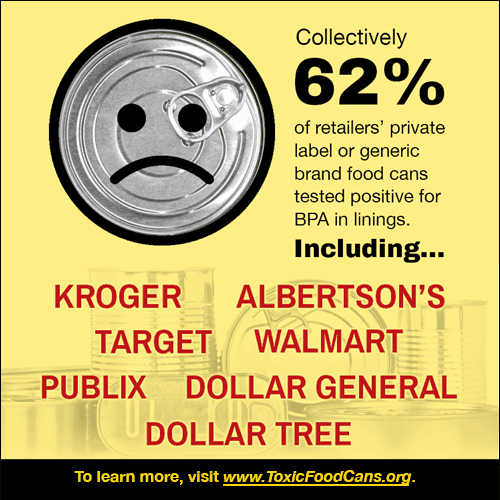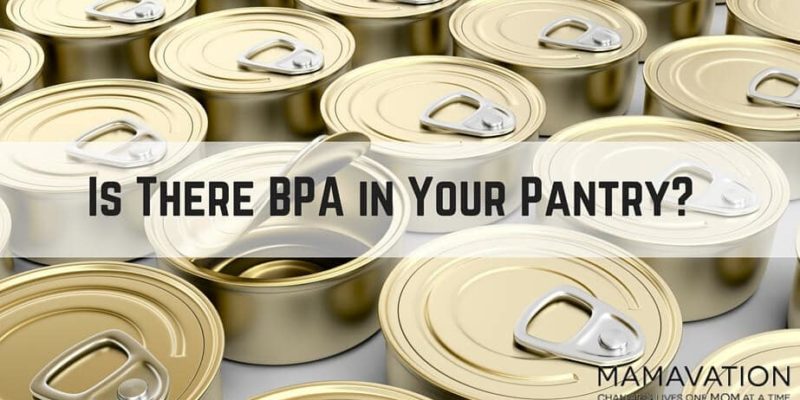#CansnotCancer has been trending on Twitter ever since a recent study analyzed the interior coatings and lids of nearly 200 canned foods in 19 states and 1 Canadian province for Bisphenol A (BPA). The study was conducted independently by non-governmental organizations (honest-biased folks with no agenda) and found: “The continued presence of BPA – and potentially unsafe alternatives – in the lining of canned foods has resulted in ongoing hazardous exposures to workers, low-income populations, pregnant women, children and other vulnerable populations.”

WHAT IS BPA??
Well, according to the smart scientists over at the Mayo Clinic, BPA is an “industrial chemical used in certain plastics” and they also tell you to: “cut back on the use of canned foods” – despite the FDA stating it is ok in “low levels” – uh, I’m going to listen to the doctors on this one, more on the reason why below.
BPA is a hormonally active chemical. What does that mean? Basically, this pesky little chemical will affect every cell in your body causing all kinds of chaos and disruptions. Side effects could cause heaps of severe health problems, including: “breast and prostate cancer, asthma, obesity, behavioral changes {attention deficit disorder – ADD}, altered development of the brain and immune system, low birth weight and lowered sperm.”
Sadly the alternatives big brands (such as Campbell’s and Del Monte) are using instead of BPA are not being disclosed, which could indicate one of two things: 1) there isn’t an alternative actually being used or 2) the alternatives are just as toxic, say – PVC?

BIG BRANDS + CHEAP FOODS = BIG MONEY
Del Monte is one of the country’s largest producers in the country with annual sales nearing $1.8 Billion– that’s only in 12 months!! Its testing showed that 10 out of 14 (71%) of their cans were positive for BPA (check out the image below). The global canned goods industry is huge and growing, grossing approximately $80 Billion (Seriously, WTF?!). Here’s a quick report card on a few others: McCormick &Company (Thai Kitchen): 3 of 3 (100%) tested positive. Nestle 3 of 3 (100%) tested positive.

Private labels (store brands) such a Kroger aren’t doing any better. There is a reason the food is dirt cheap, and that clever enticing sales such as 5 for $1, are around the store. I think it’s safe to say that companies are more concerned with increasing profits and pleasing their shareholders than their consumers.

WHAT ABOUT TRADER JOES?
We personally reached out to Trader Joes to ask them about BPA in their cans and got some very interesting responses. Trader Joe’s has been improving their canned food aisle, but not all is BPA free yet. All Tetra Pak, plastic water bottles, cookie tubs, plastic bags for produce, canned tuna, salmon, chicken, beef, most canned fruits and vegetables, beans, tomatoes, coconut milk and cream, and pet food are free from BPA in the lining. But there still are some cans containing BPA. Stay clear of the following cans containing BPA at Trader Joe’s:
- Sardines, crab, Cherrystone clams & oysters;
- Mandarins, hatch chilies, artichokes & olives, and
- Dolmas and all canned soups and stews, including Joe’s Os (except the organic soups..they are free of BPA)
In addition to these items they state, “every glass jar item has a metal lid. All metal lids DO have a layer of BPA coating, but there is a coating of another material put on top of the BPA coating. Thus, there is no direct contact of BPA to food. We have conducted multiple supplier testing results showing there is no BPA detected from metal lids.”
A FEW CHAMPIONS OUT THERE WHO CARE
Labels such as Amy’s Kitchen, Annie’s Homegrown (General Mills), Hain Celestial (Arrow Head Mills), ConAgra (Chef Boyardee) have all fully “transitioned from using BPA and have disclosed the BPA alternatives used. Eden Foods have begun to eliminate 95% of BPA-based epoxy resins”, as well.
WHAT TO DO? TIPS + GET INVOLVED + LET YOUR VOICE BE HEARD
You may be thinking, “Geesh! I’m never eating canned goods again…” or “What can I do?!” Well, turns out you can do a lot and the best way to start is by voting with your dollars (make it rain, ya’ll). Check out the “Ban Poisonous Additives Act.” Start supporting the companies laid out above (Amy’s, Annie’s, Arrow Head Mills, etc.) that already made the change and for those who have not, contact them via social media and speak your mind. Put your questions and thoughts out there in black and white, or cute colored font. Need help? Here are a few statements to start you off:
- Is there toxic #BPA in your food cans? New report says YES! #toxicfoodcans #cansnotcancer RT! www.ToxicFoodCans.org
- Toxic BPA is still hiding in many popular national brands of canned food #toxicfoodcans #cansnotcancer RT! www.ToxicFoodCans.org
- OMG. Every @CampbellSoupCo food can tested in new report by health groups had #BPA Read the report: www.ToxicFoodCans.org #CansNotCancer #toxicfoodcans
- Majority of @Kroger “private label” food cans tested had the chemical #BPA It’s time 2 #MindTheStore www.ToxicFoodCans.org #ToxicFoodCans
You can also sign a petition from Safer Chemicals Healthy Families that tells Kroger and Campbells it’s time to can the BPA (pardon the pun) and use a safer alternative. But the best advice I can give you is to “ban the can.” If you cut out the vast majority of canned food and use fresh or frozen food instead, you’ll cut out most of these problems. Canned foods are good for emergencies and “OMG there is nothing in the house to cook” days, but making them a standard part of your week is not a good idea.


 Expo West Finds: Natural Products You Don’t Want to Miss
Expo West Finds: Natural Products You Don’t Want to Miss
Thanks for this article. Who is the author? When I clicked on ‘learn more about the study, I got a car donation site. I would like to know more.
Also, I see that the two other comments, April 2016 and March 2018 have not been replied to.
Emilia, I understand that you may not like certain words used, but to me, BPA, Toxin, PVC, etc are much more vulgar and distasteful.
Muir Glen products, (tomato products, only, unfortunately) are also BPA – free and they have some products sold in glass jars.
https://www.muirglen.com/products/
Hey Janet! Thanks for stopping by! I’m the author. See if you can click on this to get the original pdf of the study, http://www.toxicfoodcans.org/wp-content/uploads/2016/03/BPA-BuyerBeware.pdf
Please don’t use or imply vulgar language, even OMG is distasteful to many. (referencing the Campbell soup graphics). I bought your book off Amazon, hope it doesn’t use language either. Thanks for considering this. Truly, it’s not funny, clever, or even necessary to get a point across.
Yes, I swear like a sailor in the book.
I love your humor Leah. Cracks me up! I appreciate you and all you do. Thanks 🙂
Lmao 😂
Hi Leah,
Great article on BPA.
I can’t quite tell whether you wrote this article (or maybe Pastaveia Monique and her husband Sean?)
In any case, I am interested in knowing the source of the quote on Eden Foods. Could you please provide a reference?
( “Eden Foods have begun to eliminate 95% of BPA-based epoxy resins.”) I don’t really understand what it means, and would like to be able to follow up with them to learn more.
Hey Elaine! Eden Foods pioneered the idea of BPA free cans. I’m not sure however what they are made of today. I did have a conversation with them years ago about this and I wasn’t impressed with what they were using as a substitute. Not sure today. However, some of their cans still contain BPA, https://www.edenfoods.com/articles/view.php?articles_id=178